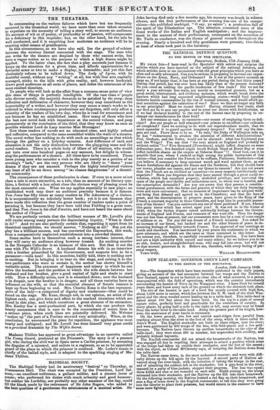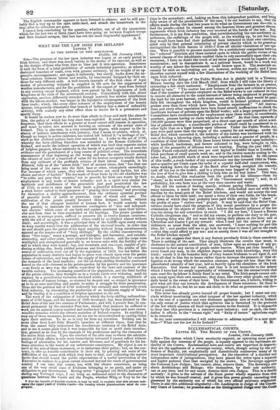NEW ZEALAND: GOVERNOR GREY'S LAST CAMPAIGN.
TO THE EDITOR OF THE SPECTATOR.
London, 20th January 1848. Sin—The despatches which have been recently published in the daily papers, giving an account of the last encounter between our troops and the Natives in New Zealand, appear to me to furnish no clear idea of what occurred„ to a person unacquainted with immediately
surrounding field of operations, which was the country surrounding the hamlet of Petro on the Wanganui river. I have lived for several years there, and know every inch of the ground on which the skirmish took place.
The site of the hamlet is part of a level flat mostly covered with high fern, about 1,000 acres in extent, which lies between the N. W. bank of the river Wan- ganui and the steep wooded ascent leading up to a table-land. This table-land is raised about 100 feet above the lower level. On the top is a plain of several square miles, perfectly level and practicable for the evolutions of cavalry. In many places, by going half-a-mile to the right or left, easy ascents may be found from the lower level to the table-land. Along the greater part of its length, how- ever, the assistance of your hands is necessary. On the lower ground, two low and narrow sand-ridges form parallel lines, reaching almost from the river to the foot of the steep, which is there called St. John's Wood. The English stockades are built on these ridges, near the river; and were garrisoned by 400 troops of the line, with field-pieces and a few artil- lerymen. The Natives have thrown up earthen breastworks on the edge of the table-land; they were about 400 in number, but nnprovided with artillery, and probably without bayonets. The English commander did not attack the breastworks of the Natives, but was engaged all day in repelling their attempts to attack a position which some of the troops had taken up outside their stockades, near the foot of the ascent; with the object, as Colonel M'Cleverty says, of tempting the Natives down from the table-land. The Natives came down, in the most undaunted manner; and were with diffi- culty driven up the hill again by the bayonet. A second party of Natives ad- vanced along the river-bank, with the intention of taking the troops in the rear, and of attacking the soldiersleft in the stockades; but a gun-boat in the river, manned by a party of blue-jackets, stopped their progress. The loss was equal; three killed and nine or ten wounded on each side. Night coming on, the troops retreated into their stockades, and the Natives up the hill into their breastwork. On the following morning, the Natives hoisted a red flag on their breastwork, and sent a flag of trace down to the English commander, to tell him they were going into the interior to plant their potatoes, but would return in the summer to have some more fighting.
The English commander appears to have listened in silence: and he will pro- bably find a way up to the open table-land, and attack the breastwork in the rear, after its defenders are gone. I cannot help concluding by the question, whether, out of all the encounters which for the last two or three years have been going on between English troops and New Zealand savages, this last has not the most disgraceful appearance? A. Z. A. Z.



























 Previous page
Previous page